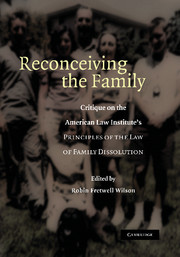 Reconceiving the Family
Reconceiving the Family Book contents
- Frontmatter
- Contents
- Acknowledgments
- Foreword, by Mary Ann Glendon
- List of Contributors
- Introduction
- PART ONE FAULT
- PART TWO CUSTODY
- 3 Partners, Care givers, and the Constitutional Substance of Parenthood
- 4 Custody Law and the ALI's PRINCIPLES: A Little History, a Little Policy, and Some Very Tentative Judgments
- 5 Undeserved Trust: Reflections on the ALI's Treatment of De Facto Parents
- PART THREE CHILD SUPPORT
- PART FOUR PROPERTY DIVISION
- PART FIVE SPOUSAL SUPPORT
- PART SIX DOMESTIC PARTNERSHIP
- PART SEVEN AGREEMENTS
- PART EIGHT JUDICIAL AND LEGISLATIVE PERSPECTIVES
- PART NINE INTERNATIONAL REFLECTIONS
- Afterword: Elite Principles: The ALI Proposals and the Politics of Law Reform, by Carl E. Schneider
- Index
4 - Custody Law and the ALI's PRINCIPLES: A Little History, a Little Policy, and Some Very Tentative Judgments
Published online by Cambridge University Press: 25 January 2010
- Frontmatter
- Contents
- Acknowledgments
- Foreword, by Mary Ann Glendon
- List of Contributors
- Introduction
- PART ONE FAULT
- PART TWO CUSTODY
- 3 Partners, Care givers, and the Constitutional Substance of Parenthood
- 4 Custody Law and the ALI's PRINCIPLES: A Little History, a Little Policy, and Some Very Tentative Judgments
- 5 Undeserved Trust: Reflections on the ALI's Treatment of De Facto Parents
- PART THREE CHILD SUPPORT
- PART FOUR PROPERTY DIVISION
- PART FIVE SPOUSAL SUPPORT
- PART SIX DOMESTIC PARTNERSHIP
- PART SEVEN AGREEMENTS
- PART EIGHT JUDICIAL AND LEGISLATIVE PERSPECTIVES
- PART NINE INTERNATIONAL REFLECTIONS
- Afterword: Elite Principles: The ALI Proposals and the Politics of Law Reform, by Carl E. Schneider
- Index
Summary
The Principles' analyses of custody law doctrines and family issues are much too well researched and documented, too rich and exhaustive, too elegantly drafted, to be described, much less analyzed, in a single chapter. This chapter seeks to put the Principles' recommended standard for deciding divorce-custody disputes in an abbreviated historical context, one that focuses on the contention of many commentators (but fewer judges and lawyers) that the much-noted indeterminacy of traditional doctrinal standards should be minimized. Part I provides that historical context; Parts II and III examine the architecture of two of the ALI's many proposals for improving the procedural norms of custody litigation, Parenting Plans and the appointment of a guardian ad litem or lawyers for the child. The chapter concludes that the product of the endeavor has substantially advanced public policy endeavors in both substantive and procedural areas of concern; the endeavor also creates new and difficult problems for custody doctrine formulation.
Substantive Standards for Awarding Custody: Policy Diversity and the ALI's “Approximate the Time” Proposal
Judges, divorce practitioners, forensically sophisticated mental health experts, as well as academic commentators agree about very little. But there does seem to be a consensus that the standards governing judicial determinations of post-divorce custody of children pose a most difficult and unresolved legal policy conundrum. Many commentators have suggested that the nature of custody litigation contributes significantly to the difficulties.
A path-breaking academic essay on custody law and practice pointed out:
[U]nder the best interests principle the outcome in court will often be uncertain: each spouse may be able to make a plausible claim for custody, and it may be impossible to predict how a court would decide a disputed case.
- Type
- Chapter
- Information
- Reconceiving the FamilyCritique on the American Law Institute's Principles of the Law of Family Dissolution, pp. 67 - 89Publisher: Cambridge University PressPrint publication year: 2006
- 1
- Cited by


